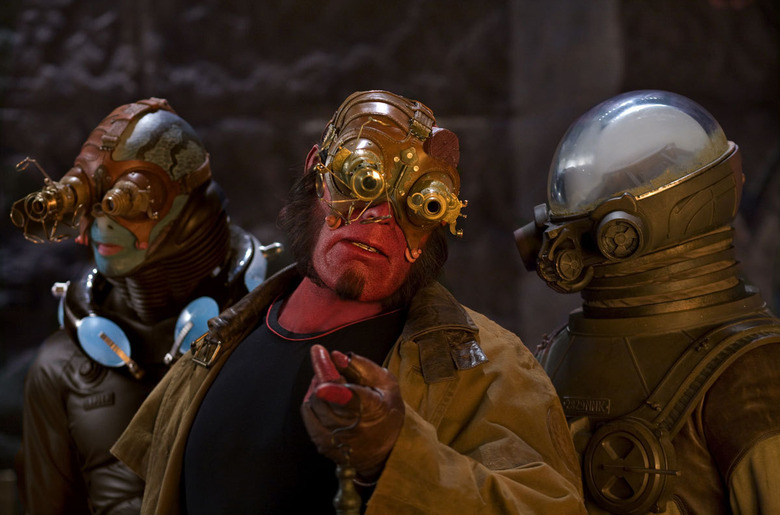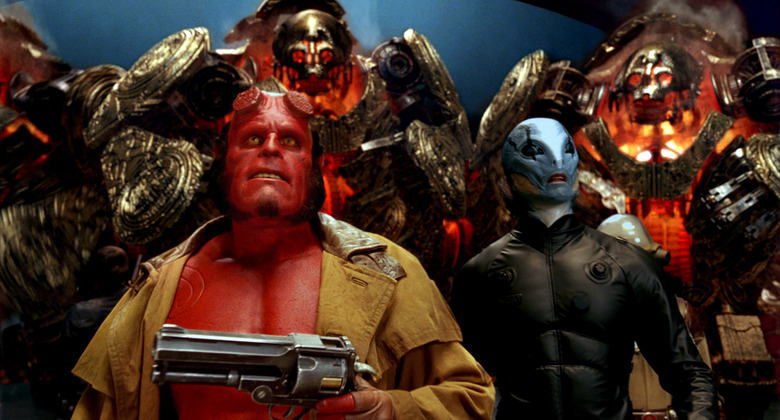'Hellboy II: The Golden Army' Turns 10 And It's More Magical Than Ever
When Hellboy (Ron Perlman) turns to his friend and partner in world-saving, Abe Sapien (Doug Jones) and notices an album collection of popular love songs, he remarks "Abe...you fell for the Princess?" To which the humanoid fish creature answers: "She...she's like me! A creature from another world..."
And in the summer of 2008 (a time in which I was a high school senior and was contemplating my future), I connected more with Abe in that moment than I ever had before. For I too was in love with "a creature" from another world. A cinematic world. It was the Hellboy movie franchise, but specifically Hellboy II: The Golden Army.
10 Years Ago...
Back when the original 2004 Hellboy arrived in theaters, 14-year old me was entranced with the power of a Guillermo del Toro-directed film. I had never seen his work before, and nothing could have prepared me for the onslaught of creepy yet stunning PG-13 visuals. It was if someone had taken over my brain and unlocked the key to its true potential, proving that modern live-action films could go places I thought only animation could. Sure, the story wasn't perfect, and it bordered on cheesy at times, but Hellboy the film (itself very different from the source comics) became a special movie to me.
Then 2008 rolled around and when the lights went down in the theater on the opening night of the next Hellboy installment, my mind was racing. Could Hellboy II: The Golden Army live up to the hype that both the original and Pan's Labyrinth, del Toros' follow-up film, had set? Would I love the characters just as much as before? And could an original Hellboy story (with a concept by both Guillermo and comic book creator, Mike Mignola) be just as good as one taken from the page?
The answer to all of that was yes.
The sequel begins with a flashback to a young Hellboy being told a bedtime story. The tale speaks of a war between the humans and magical beings of the world, and the royal family of elves involved at the story's center. Later on, we meet the eleven prince, Nuada (Luke Goss), who, in the modern era, is bent on seeking revenge against the human race and gaining control of the magical Golden Army. Will Hellboy and the rest of the B.P.R.D. team be able to stop Nuada? Or will our hero's pending destiny change the course for everyone involved? The answer, like in any del Toro movie, is not at all a simple one.
From the moment the movie began, I was stunned. Not only had del Toro's imagination gone in even more interesting directions, the film seemed like an upgrade across the board. From a way more captivating villain to the incredible fantasy world-building and heart-wrenching/hilarious character dynamics, the issues of the first Hellboy seemed to be fixed in The Golden Army.
10 Years Later...
But 10 years later, what sort of a legacy does Hellboy II leave on the film industry and the film geek world as a whole? On the outside,, the flick seems to have left little impact at all. On a recent episode of Screen Junkies, many members of the panel had forgotten the film series and decided it was due for a rewatch, and on Collider's countdown of the 50 Greatest Superhero Movies, it was ranked number 35, with a split on whether it deserved the spot or not.
Yet when it comes to those that did see and "get" what del Toro was attempting to accomplish with his now-defunct trilogy, The Golden Army is more than just another comic book movie – it is a love letter to the misfits of pop culture, and the great stories about them that came before.
With visual and narrative references to Beauty and the Beast, Frankenstein, and the works of Studio Ghibli, along with the stunning craftsmanship of all the practical effects artists that bring Hellboy's world to life, del Toro refuses to shy away from paying tribute to the greats that came before, and giving audiences a true cinematic spectacle. This kind of effort is what made other fantasy adventures like Labyrinth, The Dark Crystal, and Legend stand in a class of their own – the sweat and the tears really show up on screen.
Sadly, that isn't the kind of cinematic experience that sells audiences on purchasing a movie ticket. 2008's moviegoing audiences weren't looking for a quirky Dark Horse comic book character to take them through a troll market, explore demonic fairy tale worlds, and sing Barry Manilow tunes. Instead, they were looking for heroes that reflected the landscape of politics of the time. The kind that were saving the world from realistic foes, and rebelling against the system to eventually avenge it, even if it ruined their images in the public eye (in related news, The Dark Knight came out shortly after Hellboy II and we all know how that went).
Hellboy, as much as he is a character that I (and his cult fanbase) connect to on a personal level, isn't the kind of protagonist that'll take on the struggles of the Iraq War or the failures of the stock market on with his demonic, goodhearted strength. But he will fight whatever evil spirit or emotionally-wrecked elf prince you want, and take you for a beer at the end of the day.
You can argue up and down that the Hellboy movies aren't perfect, and may not be your cup of tea. They might not be the comic book adaptations of the Mignola comics you always dreamed of, and perhaps they have a bit too much cheese for your liking. But the audiences that appreciate a fantasy film that embraces its characters and isn't trying to push an intense, real world narrative (aside from a timeless environmental message) are the kind that embrace Hellboy II.
And maybe in the world we are in 10 years later, where the misfits of society are being threatened more than ever, Hellboy II (and the franchise as a whole) isn't as silly as it may have appeared to 2008's moviegoers. And perhaps a cat-loving, Baby Ruth-eating demon looks more appealing than ever before.


